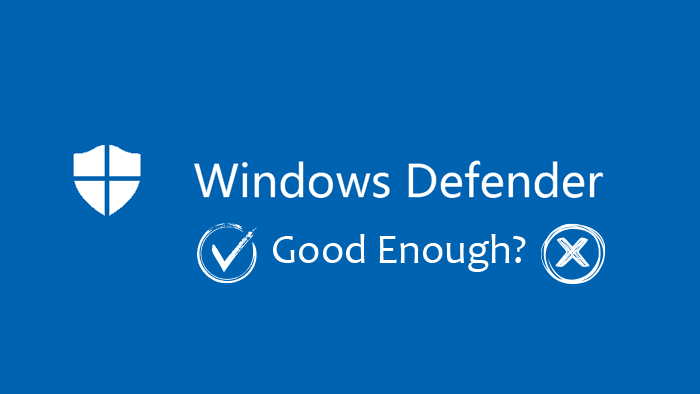
Windows Defender, now known as Microsoft Defender Antivirus, is the built-in security software that comes with Windows operating systems. It has improved significantly over the years and offers a solid level of protection, but whether it is “good enough” depends on your specific needs and usage scenario.
Here’s a breakdown of Windows Defender’s strengths and limitations:
Strengths of Windows Defender:
- Comprehensive Protection:
- Real-time Protection: Windows Defender provides real-time protection against malware, viruses, spyware, ransomware, and other threats.
- Automatic Updates: It updates automatically, ensuring your system is always protected with the latest security definitions.
- Cloud-based Protection: It uses cloud-delivered protection to detect and block emerging threats faster than traditional signature-based approaches.
- Heuristic Analysis: Windows Defender uses heuristics and machine learning to identify new and unknown threats based on behavior rather than relying solely on known virus signatures.
- Integration with Windows OS:
- Since it’s built into the system, it’s highly integrated with Windows and has minimal impact on system performance.
- Low System Impact: Unlike some third-party antivirus solutions, Defender tends to have a light footprint and does not slow down the system significantly.
- User-Friendly:
- It’s simple to use, with no complicated setup required. You don’t need to worry about compatibility issues with other software since it’s native to Windows.
- Included with Windows: It’s included with every version of Windows 10 and Windows 11, so there’s no need to install third-party antivirus software or pay for a separate product.
- Firewall and Network Protection:
- Windows Defender comes with a firewall and network protection, which helps block unauthorized access to your computer and monitors suspicious network activity.
- It also includes SmartScreen to help protect against malicious websites and downloads.
- Parental Controls and Device Performance & Health:
- Microsoft Defender offers additional features like parental controls through Family Safety and the Device Performance & Health section that helps maintain the overall health of your PC.
- Ransomware Protection:
- Controlled Folder Access is a feature of Windows Defender that helps prevent ransomware from modifying files in protected folders, which adds an extra layer of security.
Limitations of Windows Defender:
- Less Advanced Features:
- While it covers basic needs, Windows Defender doesn’t offer as many advanced features as some third-party antivirus solutions. For example, it lacks:
- Identity theft protection (offered by some third-party solutions like Norton or Bitdefender).
- VPN services or Password Managers (often included with premium antivirus suites).
- Firewall customization options that some users may need for more granular control over network traffic.
- While it covers basic needs, Windows Defender doesn’t offer as many advanced features as some third-party antivirus solutions. For example, it lacks:
- Limited Protection Against Some Types of Attacks:
- While Defender offers solid protection against most malware, it may not be as effective in preventing more advanced, sophisticated attacks such as zero-day vulnerabilities, advanced persistent threats (APT), or targeted attacks.
- It might also be slower in detecting and blocking certain types of adware and potentially unwanted applications (PUAs) compared to specialized third-party antivirus software.
- No Dedicated Support:
- Unlike paid antivirus programs, Windows Defender does not offer dedicated customer support. If you experience issues with the software or need help with a particular virus, your only option is to consult Microsoft’s online documentation and forums.
- Some Limited Threat Detection:
- While Defender has made great strides, it may not be as effective as some premium security suites in detecting more sophisticated threats like rootkits, malware packed in complex ways, or exploits targeting vulnerabilities in software.
- No Multi-Layer Protection (e.g., Sandbox):
- Many third-party antivirus solutions offer sandboxing or virtual environments where potentially harmful software can be run safely to determine if it poses a threat. This is not a feature built into Windows Defender.
When Windows Defender is Enough:
- Basic Users: If you’re a typical user who mostly uses your PC for web browsing, social media, and occasional office work, Windows Defender should be sufficient, especially if you practice safe browsing habits (not downloading suspicious files or clicking on unknown links).
- No Complex Threats: If you don’t typically encounter complex, targeted, or zero-day attacks (for example, if you don’t visit risky websites or download a lot of files from untrusted sources), Windows Defender will offer reasonable protection.
- System Performance: If you’re concerned about system performance and want minimal impact, Windows Defender is a good choice because it’s lightweight compared to many third-party antivirus tools.
When You Might Need More Protection:
- Advanced Security Features: If you need additional features such as VPNs, password managers, or identity theft protection, you might want to consider a third-party antivirus solution.
- Heavy Internet Users: If you’re more active online—especially visiting unfamiliar websites, downloading torrents, or running programs from untrusted sources—you might want a more robust solution with real-time web protection, phishing protection, and advanced firewall features.
- Small Business and Enterprise Environments: If you need enterprise-grade security with advanced threat protection, network monitoring, or specialized support, Windows Defender might not meet your needs, and third-party solutions (e.g., Bitdefender GravityZone, Crowdstrike) would be more appropriate.
Conclusion:
Windows Defender is a strong, built-in antivirus solution that offers essential protection for most home users and regular PC usage. It provides a good baseline for security with minimal system impact and decent features like real-time scanning, ransomware protection, and firewall. However, for users with more advanced needs—such as higher levels of malware protection, more comprehensive identity theft protection, or better detection of sophisticated threats—third-party antivirus solutions may offer more robust security and additional features.
In most cases, Windows Defender is good enough for general home use. But if you’re concerned about more specific threats or need additional protection tools, it might be worth considering a paid antivirus solution.




